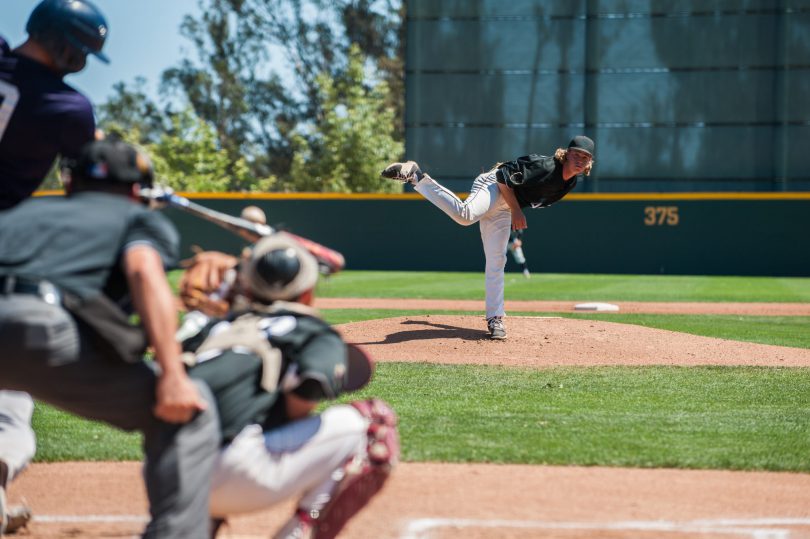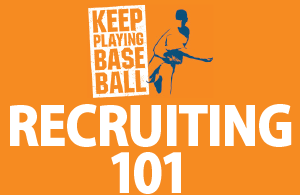Congratulations on taking your first step towards playing college baseball! If you want to play at the next level, Step 1 is learning what college baseball is all about. Step 1 will help you understand the many different college...
Step 1: Learn About College Baseball
Do This
✅ Spend time each week researching and learning about the different divisions and levels of college baseball
✅ Let curiosity be your guide and research topics, schools, and areas of interest related to college baseball
✅ Follow college baseball programs and college coaches on social media
✅ Attend local college baseball games to get a better feel for the standard of play at different levels and see first-hand how your skills measure up against the competition
✅ Meet with your school counselor to talk about different types of colleges and requirements for admission
✅ Speak with your parents/guardians/trusted circle about how you will finance your college education
Learn About This
✅ Learn about ALL levels of college baseball and the variations within each level (Mid-Major D1 vs. Power 5 D1, etc.) to better understand the various options available to you
✅ Familiarize yourself with the standard of play for each of the levels of college baseball
✅ Learn about the college baseball recruiting rules and how they differ for each level of play
✅ Learn about the eligibility requirements for the different levels of college baseball including grades, test scores, and core courses
✅ Learn about the varying costs of attending different schools (community college versus 4-year schools, public versus private universities, etc.)
✅ Learn about what life is like as a collegiate student-athlete (daily schedule, time commitment, opportunity to explore other hobbies and extra-curricular activities, in-season and off-season time demands, etc.)
Read This
Step 1: What to Read and Research
The ‘Read This’ section of Step 1 aims to give you some basic information about what it takes to play college baseball and help you meet the learning goals of the ‘Learn This’ section. This includes: What...
Academics
Academics often play a bigger role in the recruiting process than on-field skills. College coaches heavily prioritize a student-athlete's academic skills. Simply put, better grades mean more college baseball opportunities. It's important for you to understand the role that academics will play in your college search. It's even more important you understand the NCAA academic eligibility requirements and that you plan to exceed the minimum requirements. Your grades as a freshman in high school are just as important as your grades as a junior and senior. Make a habit of meeting with an academic or college counselor each semester to make sure your current and future course schedules qualify as NCAA Core Courses and allow you to meet the most difficult NCAA coursework requirements. We can't stress how important it is for you to get off on the right foot academically. Make it a priority. Here are a few areas to focus:
✅ Understand the importance academics will play in your recruitment and the opportunity good grades present in making college more affordable
✅ Familiarize yourself with the NCAA Eligibility Center website and the eligibility requirements
✅ Plan to exceed the minimum NCAA academic requirements
✅ Meet with a counselor each semester to make sure your current and future course schedules allow you to meet the most stringent NCAA coursework requirements
Player Development
Development, like academics, should remain a primary focus throughout the entire recruiting process (and your entire baseball career for that matter!). So what do you need to know about development as you start the process of finding a college program? It's simple. Emphasizing development is the single most important thing you can do to get recruited. Players who focus on constantly developing their skills are the players who find success at the college level.
You may be wondering, what does development look like? The truth is, development is not one size fits all. Since players mature physically and emotionally at different times, every recruit's development timeline will look different. One thing that all successful recruits understand is that developing into a player that has the skills that college coaches want comes before seeking exposure, going to showcases, and all the other things that eat up your money. For a typical college bound player, this likely means that your recruiting process will involve a lot of learning, researching, and growing and little contact and interactions with college coaches until late in high school. This is a good thing. Patience in the recruiting process pays off for recruits who have a good development plan.
Trust us, college coaches will become interested when you develop into a player that can show the skills, strength, and intelligence that they are looking for. Recruits who are good enough simply don't get missed by college coaches when they are doing the things we teach at Keep Playing Baseball. While growth and developmental gains happen at different times for everyone, every successful development plan will focus on four things: the mental game, strength and conditioning, baseball skill development, and nutrition/health. Here's what you should do to keep growing as a player:
✅ Adopt a growth mindset, focused on learning and improving (You either win or you learn)
✅ Implement a baseball specific strength and conditioning program
✅ Learn how to take care of your body with proper sleep, rest, and nutrition (This will allow you to maximize gains from the weight room)
✅ Practice the mental game the same way you train your physical skills (Learn to focus on controlling what you can control and controlling your reaction to what you don't)
✅ Work on all aspects of the game, even when you don't like doing it (There's no replacement for fundamentals)




